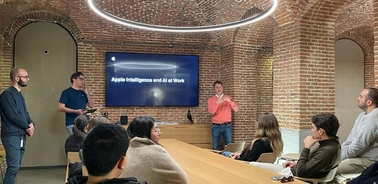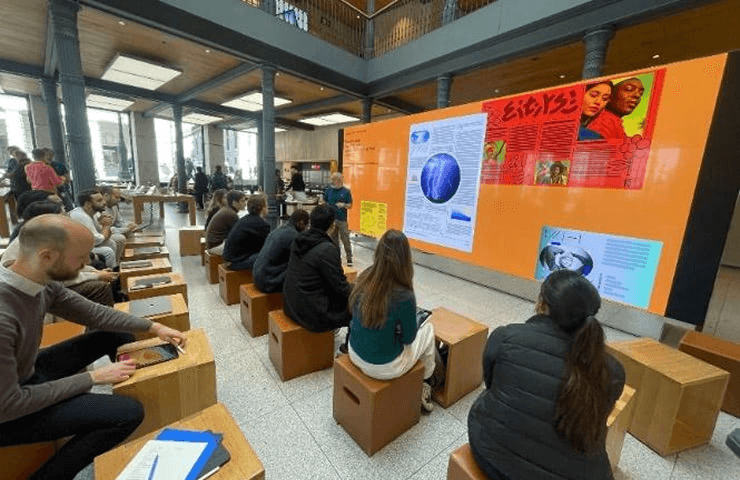Inside Apple: A Deep Dive into the Future of AI and Privacy

IE Sci-Tech Students Explore Apple Intelligence and the Future of Ethical AI.
IE University’s Sci-Tech students from the Master in Computer Science and Business Technology (MCSBT) and Master in Business Analytics and Data Science (MBDS) programs recently participated in an exclusive session at the Apple Store in Puerta del Sol. This event combined a hands-on Today@Apple experience with an in-depth presentation on Apple Intelligence—Apple’s innovative approach to artificial intelligence that emphasizes privacy and ethical considerations.
Unlike many competitors that rely heavily on cloud-based processing, Apple’s AI capabilities are designed to operate primarily on-device. This approach ensures that personal data remains under the user’s control. Apple has articulated its commitment to responsible AI development through a set of principles that include empowering users with intelligent tools, representing users authentically, designing with care to prevent misuse, and protecting privacy through on-device processing and technologies like Private Cloud Compute.
During the session, Apple demonstrated features such as advanced writing tools that refine tone and grammar across multiple languages, enhancements to communication and creative workflows, and improvements to Siri. Notably, the integration of third-party platforms like ChatGPT and the availability of Apple Intelligence to developers highlighted the potential for scalable innovation within a privacy-first framework.
Apple’s approach to AI is rooted in its core values. CEO Tim Cook has emphasized that: “privacy is a fundamental human right,” reinforcing the company’s stance on protecting user data. This philosophy is evident in Apple’s design choices, such as performing AI processing on-device and ensuring that any data used in cloud processing is not stored or accessible to Apple.
For the IE students, the visit provided valuable insights into how a leading technology company navigates the complex intersection of innovation and ethics. As one student observed, ‘It was really eye-opening to see how Apple integrates AI in a way that still prioritizes the user. It showed us that advancing technology doesn’t have to come at the expense of principles.’”
As Apple expands its AI capabilities, opening up access to developers is creating fresh opportunities for innovation—without compromising on ethics. By offering APIs that work within a privacy-focused framework, Apple is setting a strong example for how future AI ecosystems can balance flexibility and user control, while keeping developers mindful of their ethical responsibilities.
This visit was a rare opportunity for the students to see how a leading tech company weaves innovation and integrity together. It offered valuable insight into how ethical design can be a driving force in building the technologies of tomorrow.

